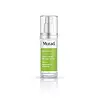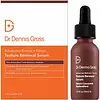What's inside
What's inside
 Key Ingredients
Key Ingredients

 Benefits
Benefits

 Concerns
Concerns

 Ingredients Side-by-side
Ingredients Side-by-side

Water
Skin ConditioningCyclopentasiloxane
EmollientIsopropyl Palmitate
EmollientC14-22 Alcohols
Emulsion StabilisingPolymethylsilsesquioxane
Dimethicone
EmollientPropanediol
SolventGlyceryl Stearate
EmollientPEG-100 Stearate
Shea Butter Ethyl Esters
EmollientRetinol
Skin ConditioningHydroxypinacolone Retinoate
Skin ConditioningCeramide NP
Skin ConditioningSodium Hyaluronate
HumectantSolanum Lycopersicum Fruit Extract
AntioxidantSwertia Chirata Extract
HumectantSqualane
EmollientPunica Granatum Extract
AstringentTocopheryl Acetate
AntioxidantGlycine Soja Extract
Skin ConditioningUrea
BufferingYeast Amino Acids
HumectantTrehalose
HumectantInositol
HumectantTaurine
BufferingBetaine
HumectantGlycerin
HumectantCaprylic/Capric Triglyceride
MaskingDimethyl Isosorbide
SolventSilica
AbrasiveEthylhexyl Palmitate
EmollientSilica Dimethyl Silylate
EmollientButylene Glycol
HumectantLecithin
EmollientAmmonium Acryloyldimethyltaurate/Vp Copolymer
C12-20 Alkyl Glucoside
EmulsifyingCetyl Palmitate
EmollientLaureth-23
CleansingPolysorbate 20
EmulsifyingTrideceth-6 Phosphate
EmulsifyingSynthetic Fluorphlogopite
Phenoxyethanol
PreservativeEthylhexylglycerin
Skin ConditioningChlorphenesin
AntimicrobialDisodium EDTA
Sodium Hydroxide
BufferingTris(Tetramethylhydroxypiperidinol)Citrate
StabilisingSodium Benzotriazolyl Butylphenol Sulfonate
UV AbsorberCI 77891
Cosmetic ColorantCI 14700
Cosmetic ColorantAlpha-Isomethyl Ionone
PerfumingCitronellol
PerfumingParfum
MaskingWater, Cyclopentasiloxane, Isopropyl Palmitate, C14-22 Alcohols, Polymethylsilsesquioxane, Dimethicone, Propanediol, Glyceryl Stearate, PEG-100 Stearate, Shea Butter Ethyl Esters, Retinol, Hydroxypinacolone Retinoate, Ceramide NP, Sodium Hyaluronate, Solanum Lycopersicum Fruit Extract, Swertia Chirata Extract, Squalane, Punica Granatum Extract, Tocopheryl Acetate, Glycine Soja Extract, Urea, Yeast Amino Acids, Trehalose, Inositol, Taurine, Betaine, Glycerin, Caprylic/Capric Triglyceride, Dimethyl Isosorbide, Silica, Ethylhexyl Palmitate, Silica Dimethyl Silylate, Butylene Glycol, Lecithin, Ammonium Acryloyldimethyltaurate/Vp Copolymer, C12-20 Alkyl Glucoside, Cetyl Palmitate, Laureth-23, Polysorbate 20, Trideceth-6 Phosphate, Synthetic Fluorphlogopite, Phenoxyethanol, Ethylhexylglycerin, Chlorphenesin, Disodium EDTA, Sodium Hydroxide, Tris(Tetramethylhydroxypiperidinol)Citrate, Sodium Benzotriazolyl Butylphenol Sulfonate, CI 77891, CI 14700, Alpha-Isomethyl Ionone, Citronellol, Parfum
Water
Skin ConditioningPropylene Glycol
HumectantDimethyl Isosorbide
SolventPolyglyceryl-10 Laurate
Skin ConditioningGlycerin
HumectantEthoxydiglycol
HumectantLactic Acid
BufferingHydroxypropyl Starch Phosphate
Mandelic Acid
AntimicrobialRetinol
Skin ConditioningBakuchiol
AntimicrobialNephelium Lappaceum Leaf Extract
Skin ConditioningFerulic Acid
AntimicrobialSqualane
EmollientLinoleic Acid
CleansingSalicylic Acid
MaskingSalix Alba Bark Extract
AstringentPhospholipids
Skin ConditioningSoy Isoflavones
Skin ConditioningSodium Hyaluronate
HumectantSaccharide Isomerate
HumectantUbiquinone
AntioxidantSodium PCA
HumectantHexylresorcinol
AntimicrobialQuercetin
AntioxidantAdenosine
Skin ConditioningMorus Alba Bark Extract
Skin ConditioningPanthenol
Skin ConditioningGlycolic Acid
BufferingMaltodextrin
AbsorbentXanthan Gum
EmulsifyingLeuconostoc/Radish Root Ferment Filtrate
AntimicrobialCaprylic/Capric Triglyceride
MaskingPotassium Hydroxide
BufferingPolysorbate 20
EmulsifyingSodium Phytate
Citric Acid
BufferingSodium Citrate
BufferingPhenoxyethanol
PreservativeSodium Benzoate
MaskingPotassium Sorbate
PreservativeWater, Propylene Glycol, Dimethyl Isosorbide, Polyglyceryl-10 Laurate, Glycerin, Ethoxydiglycol, Lactic Acid, Hydroxypropyl Starch Phosphate, Mandelic Acid, Retinol, Bakuchiol, Nephelium Lappaceum Leaf Extract, Ferulic Acid, Squalane, Linoleic Acid, Salicylic Acid, Salix Alba Bark Extract, Phospholipids, Soy Isoflavones, Sodium Hyaluronate, Saccharide Isomerate, Ubiquinone, Sodium PCA, Hexylresorcinol, Quercetin, Adenosine, Morus Alba Bark Extract, Panthenol, Glycolic Acid, Maltodextrin, Xanthan Gum, Leuconostoc/Radish Root Ferment Filtrate, Caprylic/Capric Triglyceride, Potassium Hydroxide, Polysorbate 20, Sodium Phytate, Citric Acid, Sodium Citrate, Phenoxyethanol, Sodium Benzoate, Potassium Sorbate
 Reviews
Reviews

Ingredients Explained
These ingredients are found in both products.
Ingredients higher up in an ingredient list are typically present in a larger amount.
This ingredient is an emollient, solvent, and texture enhancer. It is considered a skin-softener by helping the skin prevent moisture loss.
It helps thicken a product's formula and makes it easier to spread by dissolving clumping compounds.
Caprylic Triglyceride is made by combining glycerin with coconut oil, forming a clear liquid.
While there is an assumption Caprylic Triglyceride can clog pores due to it being derived from coconut oil, there is no research supporting this.
Learn more about Caprylic/Capric TriglycerideDimethyl Isosorbide is a low-irritation solvent that helps deliver actives into your skin. It is created from glucose.
Research shows how well this ingredient works depends on the active and formulation rather than the concentration alone. This means adding more Dimethyl Isosorbide does not guarantee better penetration of ingredients into the skin.
Glycerin is already naturally found in your skin. It helps moisturize and protect your skin.
A study from 2016 found glycerin to be more effective as a humectant than AHAs and hyaluronic acid.
As a humectant, it helps the skin stay hydrated by pulling moisture to your skin. The low molecular weight of glycerin allows it to pull moisture into the deeper layers of your skin.
Hydrated skin improves your skin barrier; Your skin barrier helps protect against irritants and bacteria.
Glycerin has also been found to have antimicrobial and antiviral properties. Due to these properties, glycerin is often used in wound and burn treatments.
In cosmetics, glycerin is usually derived from plants such as soybean or palm. However, it can also be sourced from animals, such as tallow or animal fat.
This ingredient is organic, colorless, odorless, and non-toxic.
Glycerin is the name for this ingredient in American English. British English uses Glycerol/Glycerine.
Learn more about GlycerinPhenoxyethanol is a preservative that has germicide, antimicrobial, and aromatic properties. Studies show that phenoxyethanol can prevent microbial growth. By itself, it has a scent that is similar to that of a rose.
It's often used in formulations along with Caprylyl Glycol to preserve the shelf life of products.
Polysorbate 20 is made by combining ethoxylation of sorbitan, ethylene oxide, and lauric acid. It is a mild cleansing agent, surfactant, and emulsifier.
As a surfactant, it helps collect dirt and oils for washing. Emulsifiers prevent oils and water from separating.
Polysorbate 20 also adds scent to a product. Since it is made using sorbitol, it has a sweet scent. Sorbitol can also be found in fruits such as apples and peaches.
The lauric acid used to create Polysorbate 20 is often derived from coconuts.
Polysorbate 20 may not be fungal acne safe.
Learn more about Polysorbate 20Retinol is a gold-standard ingredient for anti-aging. It is a form of Vitamin A and belongs to the class of retinoids that also includes tretinoin.
Why is retinol famous?
It has the most scientific studies backing up its skin benefits out of all the non-prescription ingredients.
Retinol is proven to:
This is why retinol is effective at removing wrinkles, fading dark spots, treating acne, and reducing the appearance of pores.
Studies show retinol is less effective when exposed to UV. Be sure to look for appropriate packaging to keep your retinol potent (similar to Vitamin C).
Using retinol or any retinoids will increase sun-sensitivity in the first few months. Though studies show retinoids increase your skin's natural SPF with continuous use, it is best to always wear sunscreen and sun-protection.
We recommend speaking with a medical professional about using this ingredient during pregnancy.
Retinol may cause irritation in some people, so be sure to patch test. Experts recommend 'ramping up' retinol use: start using this ingredient once a week and work up to using it daily.
Read about Tretinoin
Learn more about RetinolSodium Hyaluronate is hyaluronic acid's salt form. It is commonly derived from the sodium salt of hyaluronic acid.
Like hyaluronic acid, it is great at holding water and acts as a humectant. This makes it a great skin hydrating ingredient.
Sodium Hyaluronate is naturally occurring in our bodies and is mostly found in eye fluid and joints.
These are some other common types of Hyaluronic Acid:
Learn more about Sodium HyaluronateSqualane is an emollient that helps the skin hold onto moisture. It's an oily liquid that occurs naturally in certain types of fish and plant oils.
Because squalane boosts hydration in the skin, it also comes with plenty of benefits: it is an antioxidant and can help fight free radicals and skin damage. Squalane is also found to have a detoxifying effect when applied.
Squalane comes from squalene, which occurs naturally within the sebum of our skin. It is one of the oils our skin produces to keep itself hydrated. Squalane is the hydrogenated version of squalene and has a longer shelf life.
Research shows that squalane is non-irritating (even at 100% concentration).
In general, it's a fantastic ingredient. It does a great job at hydrating the skin, and it's suitable for those with sensitive skin.
The source of squalane may impact malassezia / fungal acne. This is because olive oil derived squalane can contain impurities such as fatty acids and plant waxes. Sugarcane derived squalane is recommended for anyone with malassezia concerns.
Is squalane vegan?
This depends on the source. Squalane can be derived from both plants and animals. Most squalane used in skincare comes from plants.
Please note: the source of squalane is only known if disclosed by the brand. We recommend reaching out to the brand if you have any questions about their squalane.
Read more about squalene with an "e".
Is squalane an oil?
Squalane is often called an oil, but it’s technically not; it’s a hydrocarbon, meaning it’s only made of carbon and hydrogen, unlike true oils which are triglycerides made of fatty acids and glycerol.
The term “oil-free” isn’t regulated, so companies can define it however they want. Some exclude all oils, while others just avoid mineral oil or comedogenic oils.
While some people avoid oils thinking they cause breakouts, the right kind of oil (or oil-like ingredient like squalane) can actually help balance and hydrate your skin. It’s worth testing out simple oils or squalane to see what works best for your skin.
Learn more about SqualaneWater. It's the most common cosmetic ingredient of all. You'll usually see it at the top of ingredient lists, meaning that it makes up the largest part of the product.
So why is it so popular? Water most often acts as a solvent - this means that it helps dissolve other ingredients into the formulation.
You'll also recognize water as that liquid we all need to stay alive. If you see this, drink a glass of water. Stay hydrated!
Learn more about Water